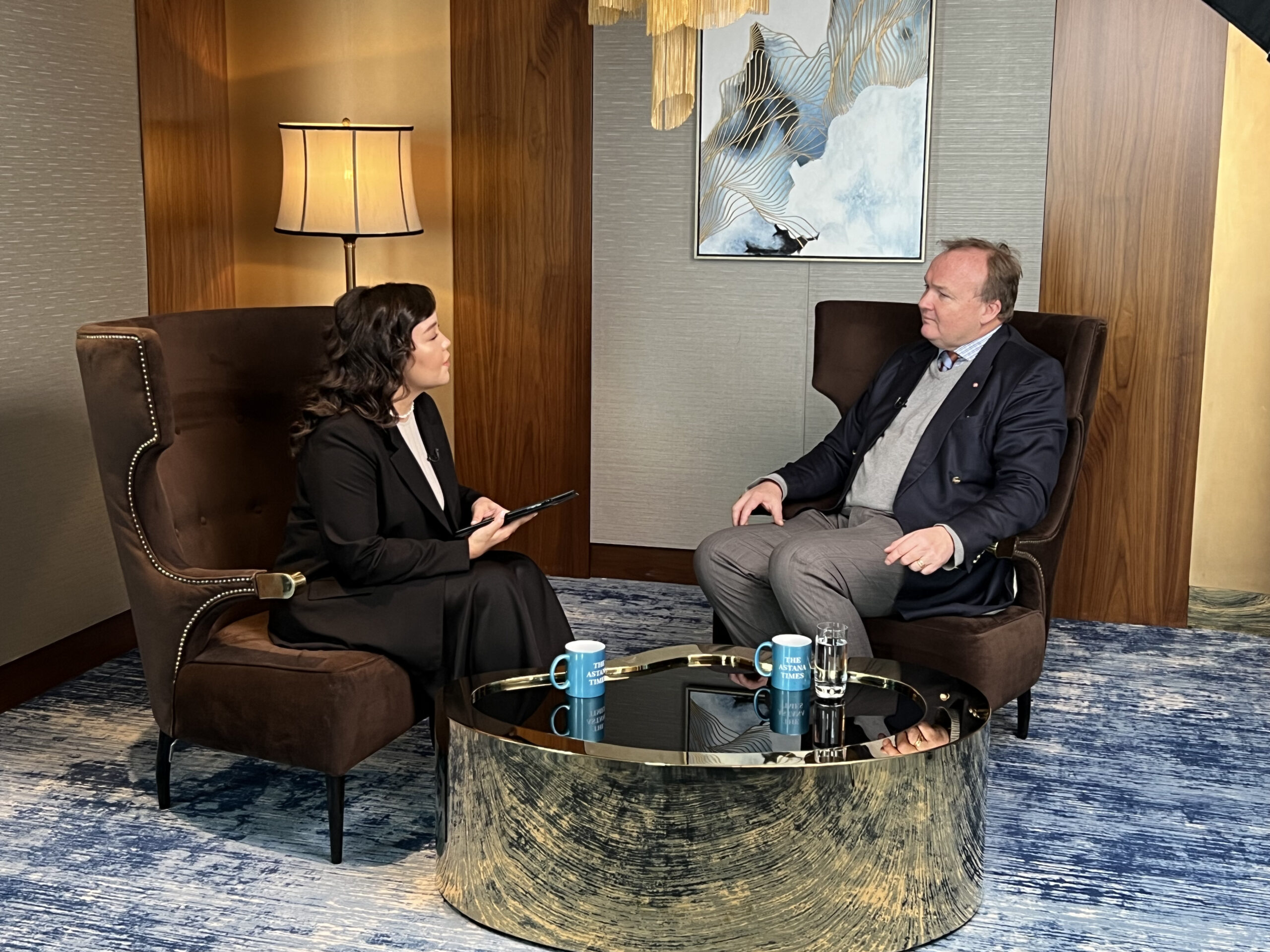ASTANA – Kazakhstan and Central Asia are witnessing a decade of opportunities, but opportunities come with an array of challenges. Yet, the region is doing a good job in balancing complexities with opportunities, said Mark Beer OBE, British lawyer and businessman, a co-founder of the Seven Pillars Law firm in Kazakhstan, in an interview with The Astana Times.

Photo credit: The Astana Times.
“This is a decade of opportunity for Central Asia and Kazakhstan, at the very heart of Central Asia. We see all economic indicators are heading in the right direction. The rule of law scores are heading in the right direction. We have got a wonderful financial center [referring to the Astana International Financial Centre (AIFC)], which, for a foreign investor, provides familiarity and security and trust in the investment landscape, using the financial center to invest in the broader Central Asia region,” said Beer.

Professor Mark Beer OBE
Opportunities come along with certain challenges, which require delicate balancing from Kazakhstan and the region of Central Asia.
“This is also a decade of complexity. Complexity for Kazakhstan to the north, complexity for Kazakhstan to the east, and then, obviously, a very changing political landscape in the West. The balancing act is going to be to stay open for investment and also to manage the complexity of an ever-changing world. So far, Kazakhstan is doing a fantastic job, as are other Central Asian countries, in balancing opportunity and complexity,” he said.
Speaking of what makes Kazakhstan an attractive investment destination, Beer highlighted stability and trust.
“If you have a problem in Kazakhstan, you have an English language common law system. You have arbitration that you can use, you have a Kazakh language court system that you can use. If you think about an investment decision, we know the opportunities there,” said Beer.
Robust financial center
Among promising areas for investment, Beer specifically underscored the financial services sector. He highlighted the importance of the AIFC as a cornerstone for attracting foreign investors, praising its robust court and judicial system featuring judges from around the world. He emphasized the transparency and simplicity of the rules, which are accessible online, and commended the team overseeing the center.
Beer attributed the growth of the financial services sector, a key player in Kazakhstan’s economy, to the establishment of the AIFC just five years ago. Despite its relatively short existence, the financial center has outperformed other international financial centers in terms of business activity, licenses issued, investment attracted, and foreign participation.
“It’s like an unsung hero, the jewel in the crown that’s covered over and people don’t see it,” he said.
According to Beer, the AIFC’s court is effective even when the government is involved, noting the government’s adherence to judgments issued by the center.
“The courts are great until the government is involved – not the case here. The financial center is able to issue judgments, and the government pays. So that’s what I think the President was referring to saying: if you come here, you invest your skill, you invest your money, you grow the market, you grow jobs, you create opportunities, and you do it in a good faith basis, not just to pillage, not just as grab and run, but to really sustainably invest. The country will look after you as any country should, using the rule of law and using a solid and good court system,” he said.
Among other areas boasting ample opportunities are startups and small and medium-sized businesses.
At the same time, Beer lamented the lack of investment in manufacturing. Regarding the challenges in manufacturing, Beer mentioned the complexity and bureaucracy, comparing it to the ease of investing in the United States.
He mentioned the progress seen in the mining sector through online application portals and licensing systems and expressed a desire for similar ease of operation in the manufacturing sector.
An overarching goal for the nation’s economy, he noted, is converting Kazakhstan’s mineral wealth into value-added products domestically rather than exporting raw materials.
The level playing field for investments
Beer asserted the importance of a level playing field and an open investment policy, where individuals willing to contribute to the economy through job creation, tax payment, and adherence to the law are welcomed, regardless of their nationality or ethnicity.
“If I’m a successful businessman from England, and if you’re a successful businesswoman in Kazakhstan, why should you get less rights than me?” he said.
He described the successful investment as akin to a marriage, where each party brings unique strengths and resources to the table. Whether it is a foreign corporation bringing intellectual property and expertise or a local investor contributing market knowledge and connections, the combination of these elements creates a stronger and more sustainable partnership.
While commending the ongoing reforms in Kazakhstan, Beer emphasized the importance of the right implementation to turn reform ideas into reality.
He acknowledged the clear vision for Kazakhstan’s new economic model set forth by the President. This model was reiterated by President Kassym-Jomart Tokayev at the expanded government meeting on Feb. 7, including doubling the country’s GDP to $450 billion by 2029.
“I am really hoping we will see that unity of government behind the vision of the President,” he added. The new government has a challenging task now to significantly step up measures to see real growth.
The success of Kazakh companies on the global stage is central to that effort, said Beer. He specifically mentioned Air Astana’s initial public offering (IPO) taking place in London and Kazakhstan.
Vibrant young population
Spending more than a decade working with Kazakhstan, Beer observed the abundance of talent and skill among the youth in Kazakhstan, acknowledging their world-class abilities.
“They operate happily in multiple cultures because Kazakhstan has so many cultures within it,” he said.
Additionally, he highlighted the interpersonal skills instilled in Kazakhstan’s youth, noting their adeptness in interacting with people from all walks of life, from top executives to everyday individuals.
Young people will drive the future of Kazakhstan, he said. Thousands of bright talents had a chance to study abroad under the Bolashak scholarship program.
“Look at the institutions that people have gone to. They haven’t gone abroad to go to some third-rate university. They’ve gone to Harvard, Yale, Oxford, Cambridge, and Queen Mary’s. I mean, they’ve gone to the world’s leading universities, so it reinforces enormous talent, giving the opportunity to experience the global marketplace, come back here, and they are going to be driving the future. You know, that’s the future of Kazakhstan; harnessing that talent is going to be the reason why the country continues to do well,” he said.
Legal reforms
Reflecting on his decade-long involvement with Kazakhstan, he highlighted the changes witnessed during this time, such as the digitization of the court system and the streamlining of justice tiers to enhance efficiency.
“There is no country that has the perfect system because there isn’t a perfect system. What I’ve seen here is a realization that a decade ago, the system could do with improvement and then the vision to understand what that improvement should be,” he said.
There is a clear correlation between well-functioning courts and economic prosperity, which applies to Kazakhstan as well. Beer stressed the importance of a robust legal system in promoting investor confidence, fostering business growth, and ensuring justice for all stakeholders.
“Because in every system that follows the rule of law, that has a solid, trusted court system, that delivers justice on time that people trust, it drives investment, foreign direct investment, and that investment creates new jobs,” he said.
He brought the example of a financial center in Dubai and its transformative impact on the economy, citing its growth from 3% to 14% within a decade. He emphasized that this expansion represented a significant diversification away from Dubai’s traditional economic activities.
“It created 25,000 jobs, not relocating people, new jobs, successful, wealthy, good paying jobs for talented people, local people and international people,” he said.
Overall, Beer is optimistic about the vast potential and opportunities present in Kazakhstan, citing numerous instances of remarkable talent and promising prospects. He suggested that perhaps there should be more emphasis on celebrating successes within the country.
You can watch the full interview on The Astana Times YouTube channel.

